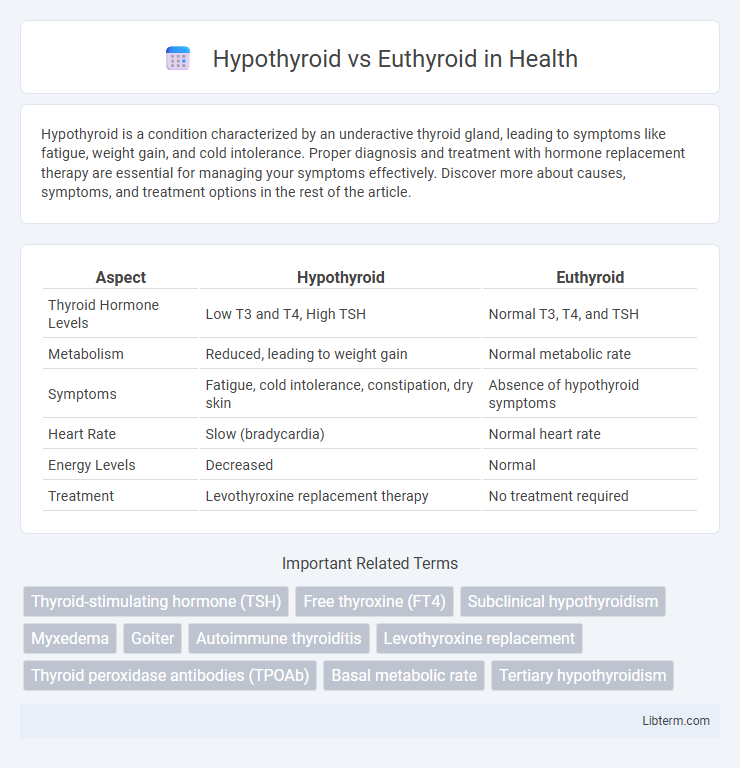Hypothyroid is a condition characterized by an underactive thyroid gland, leading to symptoms like fatigue, weight gain, and cold intolerance. Proper diagnosis and treatment with hormone replacement therapy are essential for managing your symptoms effectively. Discover more about causes, symptoms, and treatment options in the rest of the article.
Table of Comparison
| Aspect | Hypothyroid | Euthyroid |
|---|---|---|
| Thyroid Hormone Levels | Low T3 and T4, High TSH | Normal T3, T4, and TSH |
| Metabolism | Reduced, leading to weight gain | Normal metabolic rate |
| Symptoms | Fatigue, cold intolerance, constipation, dry skin | Absence of hypothyroid symptoms |
| Heart Rate | Slow (bradycardia) | Normal heart rate |
| Energy Levels | Decreased | Normal |
| Treatment | Levothyroxine replacement therapy | No treatment required |
Understanding Thyroid Function: Hypothyroid vs Euthyroid
Thyroid function is crucial for regulating metabolism, with hypothyroid conditions characterized by an underactive thyroid gland leading to low production of thyroid hormones such as T3 (triiodothyronine) and T4 (thyroxine). Euthyroid status indicates normal thyroid function where hormone levels are balanced, ensuring proper metabolic processes and energy regulation. Diagnostic markers such as elevated TSH (thyroid-stimulating hormone) often signify hypothyroidism, whereas euthyroid individuals display TSH and thyroid hormone levels within reference ranges.
Key Differences Between Hypothyroid and Euthyroid States
Hypothyroid states are characterized by insufficient thyroid hormone production, leading to symptoms like fatigue, weight gain, and cold intolerance, whereas euthyroid states maintain normal thyroid hormone levels and metabolic function. Laboratory tests typically show elevated thyroid-stimulating hormone (TSH) and low free thyroxine (T4) in hypothyroidism, while euthyroid individuals exhibit normal TSH and T4 levels. The key difference lies in hormone balance impacting metabolism, thermoregulation, and overall physiological homeostasis.
Causes and Risk Factors of Hypothyroidism
Hypothyroidism commonly results from autoimmune disorders such as Hashimoto's thyroiditis, iodine deficiency, or thyroid surgery, leading to insufficient thyroid hormone production. Risk factors include female gender, advancing age, family history of thyroid disease, and exposure to radiation or certain medications like lithium. Understanding these causes and risk factors is crucial for early diagnosis and effective management of hypothyroid conditions.
Typical Signs and Symptoms of Hypothyroidism
Hypothyroidism is characterized by symptoms such as fatigue, weight gain, cold intolerance, constipation, dry skin, and hair thinning, reflecting decreased thyroid hormone production. Patients often experience bradycardia, depression, memory impairment, and menstrual irregularities, distinguishing hypothyroid status from euthyroid individuals who maintain normal metabolic function and hormone levels. Recognizing these clinical signs is essential for diagnosing hypothyroidism and differentiating it from euthyroid conditions.
Euthyroid: Definition and Clinical Importance
Euthyroid refers to the state of having normal thyroid gland function with balanced levels of thyroid hormones T3 and T4, essential for regulating metabolism, growth, and energy expenditure. Clinically, maintaining a euthyroid status is crucial for overall health, as deviations can lead to hypothyroidism or hyperthyroidism, impacting cardiovascular function, mental health, and metabolic processes. Accurate diagnosis and monitoring of euthyroid status help prevent complications and guide appropriate thyroid disorder treatments.
Diagnostic Tests for Thyroid Function
Hypothyroid diagnosis primarily relies on elevated thyroid-stimulating hormone (TSH) levels combined with low free thyroxine (FT4) concentrations, indicating underactive thyroid function. Euthyroid individuals exhibit normal TSH and FT4 values within established reference ranges, reflecting balanced thyroid activity. Additional tests such as thyroid peroxidase antibodies (TPOAb) help differentiate autoimmune thyroiditis from other causes in hypothyroid patients.
Interpreting Thyroid Hormone Levels: TSH, T3, and T4
In hypothyroid conditions, elevated TSH levels typically indicate the pituitary gland's response to low circulating thyroid hormones, with decreased free T3 and free T4 levels reflecting reduced thyroid hormone production. Euthyroid status is characterized by TSH, free T3, and free T4 levels within their respective reference ranges, indicating normal thyroid function and hormonal balance. Accurate interpretation of these thyroid hormone levels is essential for diagnosing thyroid disorders and guiding appropriate treatment strategies.
Health Impacts: Hypothyroid vs Euthyroid
Hypothyroid individuals experience slowed metabolism, fatigue, weight gain, and increased risk of cardiovascular disease due to insufficient thyroid hormone production, while euthyroid patients maintain balanced hormone levels supporting normal metabolic and organ function. Untreated hypothyroidism can lead to serious complications such as myxedema and infertility, whereas euthyroid status indicates optimal thyroid health without these risks. Maintaining euthyroid status is critical for overall well-being and preventing the adverse health impacts associated with hypothyroidism.
Management and Treatment Approaches
Hypothyroid management primarily involves daily administration of levothyroxine to restore normal thyroid hormone levels and alleviate symptoms, with dosage carefully adjusted based on regular TSH and free T4 blood tests. In contrast, euthyroid patients maintain balanced thyroid function and typically require no treatment but should undergo routine monitoring if at risk for thyroid dysfunction. Lifestyle modifications such as iodine-rich diet and avoiding goitrogens support thyroid health in both conditions, though hypothyroid individuals often need long-term medical supervision to prevent complications.
Long-Term Outlook: Monitoring Thyroid Health
Hypothyroid individuals require consistent thyroid hormone replacement therapy and regular monitoring of TSH and free T4 levels to maintain hormonal balance and prevent complications such as cardiovascular disease and cognitive decline. Euthyroid individuals with normal thyroid function typically have a stable long-term outlook but should undergo periodic thyroid function tests to detect early signs of dysfunction. Early diagnosis and tailored management strategies significantly improve quality of life and reduce risks associated with thyroid disorders.
Hypothyroid Infographic

 libterm.com
libterm.com